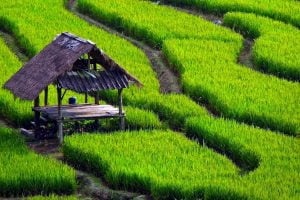
Observing the results of the 2018 inter-census agriculture survey conducted by the Central Statistics Agency (BPS) in 2018 is strongly worrying. Indonesia seems to be experiencing a peasant crisis. Farmers’ families in Indonesia are dominated by old farmers. From 27 682 of farmer families, more than 65 percent are aged over 45 years. Even as many as 22.60 percent of farmers are aged between 55 to 64 years. Older farmers, aged over 55 years, amounted to 14.89 percent. The most worrying is that farmers who are young — aged 25 years or under — is merely 0.69 percent. The future of our agriculture – based on the data presented in Table 1 – is very sad. Our farmers are endangered. The food self-sufficiency program threatened to get fail. In fact, Indonesia is feared that it will become a country with a large population of over 300 million, which depends on food from other countries. This is very ironic, and it strongly requires a very serious solution.
Table 1. The Amount of Farmer Family in Indonesia Based on the Age Group
| No.
|
Age Group (Year) | Amount (Head of Household) | Percentage |
| 1 | ≤ 25 | 191 000 | 0.69 |
| 2 | 25-34 | 2 722 446 | 9.84 |
| 3 | 35-44 | 6 548 105 | 23.65 |
| 4 | 45-54 | 7 841 355 | 28.33 |
| 5 | 55 – 64 | 6 256 083 | 22.60 |
| 6 | ≥ 65 | 4 123 128 | 14.89 |
| Total | 27 682 117 | 100.00 |
Sources: The Result of Inter-Census Agricultural Survey (BPS, 2018)
Based on a very simple and optimistic human calculation – where the life expectancy of Indonesian people is over 70 years – in the next ten years we will lose about 1 123 128 farmers. In the next ten years, we will lose 6 256 083 farmers; and in the next ten years we will lose 7 841 355 farmers. Within these 30 years we will lose 65.82 percent of farmers. If now there are 27 682 117 people who are heads of farmer families, then within 30 years we have lost 18 220 536 farmers. In short, we will experience a crisis of farmers. Who will provide food for our bureaucrats? For our entrepreneurs? For our professionals? For the great politicians in the Houses of Parliament? Actually, we have always been assisted by farmers.
The loss of these farmers could have been accelerated by the loss of agricultural land. They no longer farm because the land is gone. They are busy selling and converting the land because they do not want to farm anymore. The two things complement each other, we do not know who is coming the first. But it is clear, our farmers are now increasingly reduced; and our agricultural land has also increasingly disappeared. It is well known, based on the results of the 1983 Agricultural Census we have around 16 million hectares of rice fields. Based on the results of the 2013 Agricultural Census our fields left only around 8 million hectares. Based on the 2018 BPN report, we have merely 7.1 million hectares of rice fields left. In some areas, the area of rice fields has also been reduced. Bogor Regency, for example, annually loses 1,000 hectares of land, according to the Head of the Bogor Food Crops, Horticulture and Plantation Office (Pikiran Rakyat, 31 March 2019).
One day we will probably say good bye to our status as an “agrarian country.” Maybe we will soon say “welcome” to a large country that is very dependent on food supplies from other countries. Indonesia is likely to have a new status as a “food insecure state”.
Economic Rationality and Farming Unwillingness
By the small income – and without calculating economic rationality – subsistence farmers are willingly subsidizing the bureaucrats, professionals, businessmen, politicians, and various other parties. However, now they have rising. The economic rationality has penetrated their minds in line with their better education. The youth are now no longer wanting to farm because of the economic considerations in their mind. Farming is a risky economic activity, long to earn, low social status, and by a small income. Youth is no longer aspired to be a farmer. The female students did not want to pray to Allah SWT to be given the match of a young farmer.
To look at the future of our food agriculture, we surveyed 100 young people with the lowest education level is senior high school; their parents own agricultural land; the young men will be the heirs of the farm; their agricultural land is still intact & has not been converted; but there is already land around it that has been converted into a garment factory and other industrial activities. The survey was conducted in Gekbrong and Warung Kondang Sub-district, Cianjur Regency, West Java, Indonesia. The sampling is done by snowball technique because of the absence of data about the children of farmers who own land and who are educated above high school.
As a result, their perceptions of farming activities (both in pre-planting activities, planting & maintaining plants, and harvesting and post-harvest activities), are mostly in the non-commitment zone. That is, they are not indifferent to farming activities. Even more worrying, 13% of the sample has a strong tendency to sell the inherited land from their parents, and as many as 60% are in the non-commitment zone. This is risky enough. They can sell land if it is more profitable for them. In short, this survey shows that the sustainability of the food agriculture sector is under serious threat.
The Government Should Intervene
Assuming that the agricultural sector is very important, and there needs to be a solution to sustain the food agriculture sector, we deliver five questions to these young people, namely: (1) the rice field owner is fully entitled to plant it with rice, other crops, or sell it according to the their needs; (2) The government has the right to buy farmers’ rice fields at prices according to the agreement; (3) Procurement of rice is not the obligation of farmers but the obligation of the Government, and the farmers can plant rice voluntarily; (4) The government should form state-owned rice fields on state-owned land, which must not be converted; and (5) The government has the right to encourage farmers to plant rice, but may not force farmers to plant rice. The five questions are a translation of the variables that we cal as “dual systems” (the farming system by the government and by the farmer)
Their response to this question was measured by a four-level of Likert scale, with scores from 1 to 4. Thus, the lowest score obtained by youth was 4 and the highest score was 20. The point of the question is that farmers are fully entitled to use their land, to farm or to other use. However, to provide food for the people, it is not the farmer’s obligation but it must be provided by the state (central government and/or regional government). The state must prepare land for rice farming originating from state-owned land, or by buying the farmer- owned-land sold by farmers.
We conduct a regression test to identify the effect of farmers’ perceptions of farming activities, farming unwillingness, and the tendency to land selling to a dual farming system. The test proved, the three independent variables have a very significant influence on dual farming systems. Thus, in the farmer’s perspective, to maintain the sustainability of agricultural land, there is no other way except the government (central or regional) should have to own the rice fields and should managed it by forming a Regional-Owned Enterprise (BUMD) which is tasked to produce food and distribute it. For more details, the results of this study can be read in a paper we wrote in the title of “From Single to Dual Systems: Initiating the Model of Rice Field Management to Optimize Staple Food Availability,” Journal of Engineering and Applied Sciences Vol 13 (21), 9259 -9268, 2018. The paper can be downloaded for free on the menu of “book and journal” of this website. **
List of Reference
Central Statistical Agency, 2018, The Result of Inter-Census Agricultural Survey 2018.
Pikiran Rakyat, March 31, 2019
- Maman dkk. (2018), “From Single to Dual System: Initiating the Model of Rice Field Management to Optimize Staple Food Availability,” Journal of Engineering and Applied Sciences Vol 13(21), 9259-9268.
U. Maman Kh. (2019) Lessons from the Food Data Polemic: The Need for Food Agriculture Policy Reformulation, from https://www.mamankh.com/en/pelajaran-dari-polemik-data-pangan-perlunya-reformulasi-kebijakan-pertanian-pangan/



